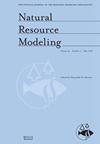生态足迹会影响生物能力吗?二十国集团国家经验的证据
IF 2.1
4区 环境科学与生态学
Q3 ENVIRONMENTAL SCIENCES
引用次数: 0
摘要
利用生态足迹和生物能力之间的差异来评估一个国家的可持续发展可能是有偏见的。因此,我们从生态系统自我调节能力的角度讨论了生态足迹对生物能力的非线性影响,这为评估一个国家的可持续性提供了一个新的视角。本研究利用二十国集团国家的面板数据,建立了一个具有连续过渡过程的面板平稳过渡模型,该模型摒弃了线性模型的约束,符合生态系统进化的渐进特征。结果表明:(1)20国集团国家生态足迹对生物容量的影响呈倒U型曲线。(2) 从一个国家的发展程度来看,发展中国家生态足迹的增长会削弱其生物能力,而发达国家的生态足迹增长会增强其生物能力。(3) 经济增长削弱了生物能力,过热的经济增长可能对生态系统产生不可逆转的影响。(4) 技术进步和人口密度增长将提高生物能力。本文章由计算机程序翻译,如有差异,请以英文原文为准。
Does ecological footprint affect biocapacity? Evidence from the experiences of G20 countries
The use of the difference between ecological footprint and biocapacity to evaluate the sustainable development of a country may be biased. Therefore, we discuss the nonlinear impact of the ecological footprint on biocapacity from the perspective of the self‐regulation capacity of the ecosystem, which provides a new perspective for evaluating the sustainability of a country. Using panel data of the G20 countries, this study establishes a panel smooth transition model with a continuous transition process, which abandons the constraints of linear models and agrees with the gradual characteristics of ecosystem evolution. The results show that: (1) For the G20 countries, the influence of ecological footprint on biocapacity presents an inverted “U” curve. (2) From the perspective of the degree of development of a country, the growth of the ecological footprint of a developing country will weaken its biocapacity, whereas that of a developed country will enhance its biocapacity. (3) Economic growth weakens biocapacity, and overheated economic growth may have an irreversible impact on the ecosystem. (4) Technological progress and population density growth will enhance biocapacity.
求助全文
通过发布文献求助,成功后即可免费获取论文全文。
去求助
来源期刊

Natural Resource Modeling
环境科学-环境科学
CiteScore
3.50
自引率
6.20%
发文量
28
审稿时长
>36 weeks
期刊介绍:
Natural Resource Modeling is an international journal devoted to mathematical modeling of natural resource systems. It reflects the conceptual and methodological core that is common to model building throughout disciplines including such fields as forestry, fisheries, economics and ecology. This core draws upon the analytical and methodological apparatus of mathematics, statistics, and scientific computing.
 求助内容:
求助内容: 应助结果提醒方式:
应助结果提醒方式:


